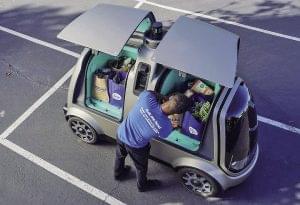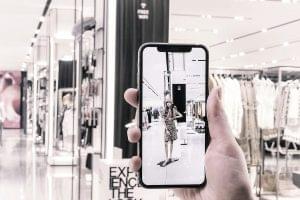Magazine: One reality isn’t enough
For traditional channels of retail adaptation can ensure that they keep their position in the new digital world. Every year the Euromoney Institutional Investor Thought Leadership (EY) prepares the EY Growth Barometer, a survey of global middle-market managers that explores their strategies for accelerating growth. More than half of 2,766 senior executives from 21 countries are calculating with 6-10 percent higher sales for 2018, and they said that intelligent automation and machine learning would make this happen. This year 73 percent of respondents said that they are already using artificial intelligence (AI) or will start doing so in two years’ time.
According to a report by GlobalData on the first quarter of the year, augmented reality (AR) is used more and more widely in the FMCG market, for instance in food packaging. Tom Vierhile, innovation insights director of the company told that there is great potential for the FMCG industry in technological innovations. For instance food packaging that utilises AR technology works very well for short promotion campaigns.
As for the expectations of consumers concerning the digitalisation of retail, Boomtown did a survey with the involvement of more than 1,000 US consumers. National, regional and local channels of retail were examined. The survey found that a wide range of digital payment solutions were important to be offered in the shops of national chains for 57 percent of respondents, and 49 percent said the same for the stores of regional retail chains. Ordering online was important for 50 percent of national chains’ customers, for 36 percent of regional stores’ shoppers and 38 percent of those buying at local retailers. Boomtown founder and CEO Chip Kahn told: it is worth investing in reliable tech solutions, as 44 percent said they would spend more in shops equipped with the latest technological solutions.

Macy Bayern from ZDNet collected 10 technologies which are leading digital transformation in retail. Digital marketing is becoming more important than ever before for retailers connecting with shoppers. This can be done with digital coupons, e-mails or games. Studying analytics is vital to understanding customers. Omnichannel commerce is a multichannel approach to shopping that aims to make the customer experience more seamless across in-person and online channels, e.g. Walmart’s order-by-text service.
AI is automating and customising the retail experience, aiming to make shopping easier for the consumer. A good example of this is Amazon Go, a fully-automated grocery store in Seattle, which eliminates checkout lines and cashiers. Voice activation AI such as the Theatro system is also popular. AR and virtual reality (VR) solutions are also important. Sensor data is key too: beacon sensors are placed all over the store, which connect to customers’ phones, sending important data to the store and making promotional offers to customers. Facial recognition technology can also be used to collect data. Cloud services are good for providing cheap and fast access to data for retailers.
Richard Slawsky from Digital Signage Today prepared a study on LED and LCD display digital signage solutions, interactive touchscreen displays and RFID-based communication, to illustrate how the latest technology can be used in practice, e.g. smart mirrors. However, let’s not forget that in an omnichannel strategy communicating with the consumer doesn’t start and end in the shop. Several brands and retail chains have already made great progress in the field of communicating directly with consumers.

Kroger, one of the biggest grocery retailers in the USA will launch its Scan, Bag, Go service in 400 stores until the end of 2018. Orders can be placed by using the ClickList app, and the parcel is delivered by a self-driving e-vehicle. Until the end of 2018 Macy’s will launch a mobile app based self-service payment in every store, plus a VR app will help shoppers to imagine what a piece of furniture would look like in their home. Fashion retailer ZARA developed a smartphone app that offers an AR experience, making certain clothes in-store come to life, being worn and introduced by a fashion model on the screen of customer’s phone.
Related news
EuroCIS 2025: Serious interest in the retail technology trade fair
Amazon and TikTok recently signed an agreement that will allow…
Read more >AI could have USD 1.6 thousand billion impact in North America by 2030
Retailers could benefit from the use of AI to varying…
Read more >KSH: retail turnover exceeded the same period of the previous year by 3.6 percent and the previous month by 1.2 percent
In October, the volume of retail trade turnover exceeded the…
Read more >Related news
The Joy of Giving! – SPAR stores collect non-perishable food for people in need
The Hungarian Maltese Charity Service and SPAR Hungary have launched…
Read more >Technological advancements and business travel
The latest research from International Workplace Group (IWG), the leading…
Read more >K&H: a gift, but what and from which store?
When it comes to Christmas gift-giving, clothes are the most…
Read more >








